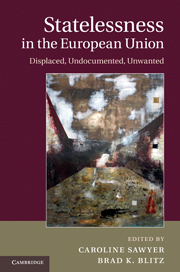Book contents
- Frontmatter
- Contents
- List of contributors
- List of cases
- List of conventions, covenants and treaties
- Acknowledgements
- List of abbreviations and acronyms
- PART I The issue
- 1 Statelessness in the European Union
- 2 Stateless people and undocumented migrants: an Arendtian perspective
- 3 The rights of non-citizens to membership
- 4 Stateless in Europe: legal aspects of de jure and de facto statelessness in the European Union
- 5 Policy responses and global discourses on the rights of non-citizens and stateless people
- PART II The research project
- 12 Conclusions
- Bibliography
- Index
- References
5 - Policy responses and global discourses on the rights of non-citizens and stateless people
from PART I - The issue
Published online by Cambridge University Press: 17 February 2011
- Frontmatter
- Contents
- List of contributors
- List of cases
- List of conventions, covenants and treaties
- Acknowledgements
- List of abbreviations and acronyms
- PART I The issue
- 1 Statelessness in the European Union
- 2 Stateless people and undocumented migrants: an Arendtian perspective
- 3 The rights of non-citizens to membership
- 4 Stateless in Europe: legal aspects of de jure and de facto statelessness in the European Union
- 5 Policy responses and global discourses on the rights of non-citizens and stateless people
- PART II The research project
- 12 Conclusions
- Bibliography
- Index
- References
Summary
Introduction
This chapter surveys the discourse on non-citizens and stateless people and assesses the degree to which it is affecting policy development and reform. It notes that this discourse is produced by a number of actors including the United Nations High Commissioner for Refugees (UNHCR), human rights monitoring bodies, domestic legislators, policy-makers and academics as well as a collection of grass-roots activists primarily based in Europe, North America, Asia and Africa. Recognising that, in contrast to the situation with the Refugee Convention, few states are parties to the Statelessness Conventions, the focus here is the development of a human rights discourse regarding the rights of non-nationals and the corresponding efforts by national, non-governmental and international actors to promote these rights. To this end, this chapter investigates the institutionalisation and diffusion of norms, principles and knowledge of the rights of de facto stateless people as set out in earlier chapters. I first examine the international relations literature on norms and international co-operation before considering the development of international advocacy on statelessness-related issues, and in particular the actions of the UNHCR and associated agencies. This is followed by a review of global and regional initiatives by international and local NGOs and civil society organisations. The chapter concludes with an evaluation of the discourse on statelessness on policy and considers ways in which policy co-ordination and co-operation in support of an inclusive agenda that respects the rights of de facto stateless people in Europe may be strengthened.
- Type
- Chapter
- Information
- Statelessness in the European UnionDisplaced, Undocumented, Unwanted, pp. 108 - 138Publisher: Cambridge University PressPrint publication year: 2011



